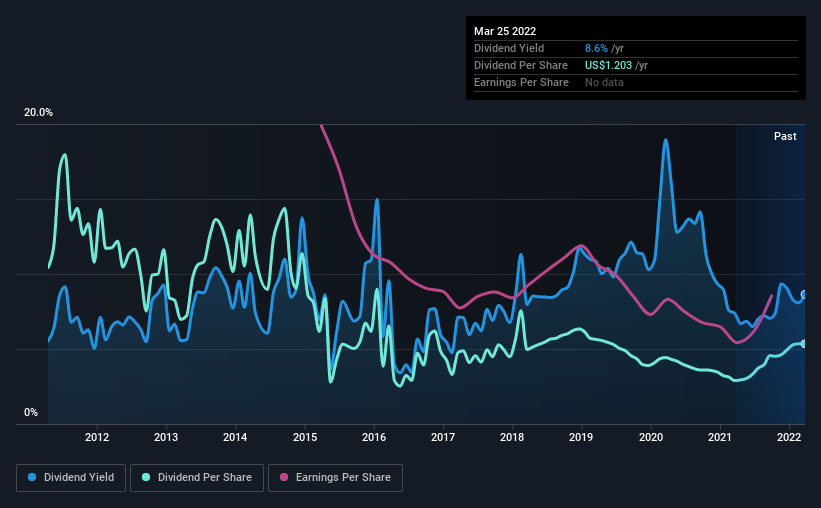We Wouldn't Be Too Quick To Buy Cross Timbers Royalty Trust (NYSE:CRT) Before It Goes Ex-Dividend
Cross Timbers Royalty Trust (NYSE:CRT) stock is about to trade ex-dividend in 3 days. The ex-dividend date is usually set to be one business day before the record date which is the cut-off date on which you must be present on the company's books as a shareholder in order to receive the dividend. The ex-dividend date is an important date to be aware of as any purchase of the stock made on or after this date might mean a late settlement that doesn't show on the record date. Meaning, you will need to purchase Cross Timbers Royalty Trust's shares before the 30th of March to receive the dividend, which will be paid on the 14th of April.
The company's next dividend payment will be US$0.054 per share, and in the last 12 months, the company paid a total of US$1.03 per share. Calculating the last year's worth of payments shows that Cross Timbers Royalty Trust has a trailing yield of 8.6% on the current share price of $13.92. We love seeing companies pay a dividend, but it's also important to be sure that laying the golden eggs isn't going to kill our golden goose! So we need to investigate whether Cross Timbers Royalty Trust can afford its dividend, and if the dividend could grow.
See our latest analysis for Cross Timbers Royalty Trust
If a company pays out more in dividends than it earned, then the dividend might become unsustainable - hardly an ideal situation. Last year, Cross Timbers Royalty Trust paid out 100% of its income as dividends, which is above a level that we're comfortable with, especially if the company needs to reinvest in its business.
Click here to see how much of its profit Cross Timbers Royalty Trust paid out over the last 12 months.
Have Earnings And Dividends Been Growing?
When earnings decline, dividend companies become much harder to analyse and own safely. If earnings decline and the company is forced to cut its dividend, investors could watch the value of their investment go up in smoke. Readers will understand then, why we're concerned to see Cross Timbers Royalty Trust's earnings per share have dropped 5.4% a year over the past five years. When earnings per share fall, the maximum amount of dividends that can be paid also falls.
Another key way to measure a company's dividend prospects is by measuring its historical rate of dividend growth. Cross Timbers Royalty Trust has seen its dividend decline 6.5% per annum on average over the past 10 years, which is not great to see. It's never nice to see earnings and dividends falling, but at least management has cut the dividend rather than potentially risk the company's health in an attempt to maintain it.
The Bottom Line
Has Cross Timbers Royalty Trust got what it takes to maintain its dividend payments? Not only are earnings per share shrinking, but Cross Timbers Royalty Trust is paying out a disconcertingly high percentage of its profit as dividends. It's not that we hate the business, but we feel that these characeristics are not desirable for investors seeking a reliable dividend stock to own for the long term. All things considered, we're not optimistic about its dividend prospects, and would be inclined to leave it on the shelf for now.
So if you're still interested in Cross Timbers Royalty Trust despite it's poor dividend qualities, you should be well informed on some of the risks facing this stock. For example, we've found 3 warning signs for Cross Timbers Royalty Trust (1 shouldn't be ignored!) that deserve your attention before investing in the shares.
A common investing mistake is buying the first interesting stock you see. Here you can find a full list of high-yield dividend stocks.
Have feedback on this article? Concerned about the content? Get in touch with us directly. Alternatively, email editorial-team (at) simplywallst.com.
This article by Simply Wall St is general in nature. We provide commentary based on historical data and analyst forecasts only using an unbiased methodology and our articles are not intended to be financial advice. It does not constitute a recommendation to buy or sell any stock, and does not take account of your objectives, or your financial situation. We aim to bring you long-term focused analysis driven by fundamental data. Note that our analysis may not factor in the latest price-sensitive company announcements or qualitative material. Simply Wall St has no position in any stocks mentioned.

